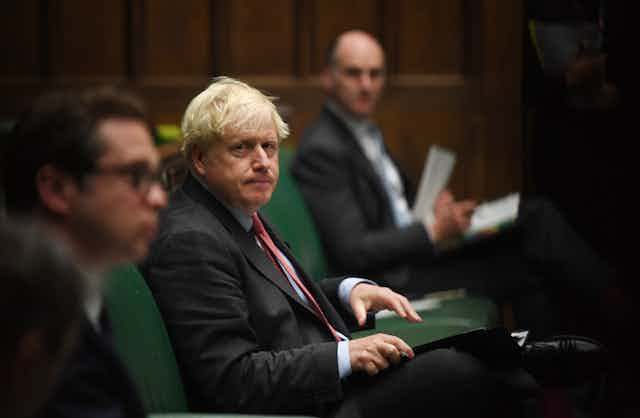In his book on Winston Churchill, Boris Johnson wrote that “one man can make all the difference”. This biographer still had faith in the “great man” theory of history. In his admiration for a charismatic and controversial figure, Johnson seemed to be hinting, or perhaps thinking, that another latter-day controversialist might also make a pretty good stab at being a national leader. But to judge by the book’s mixed reception, Johnson’s grasp of the past was not quite as reliable as it might have been.
His grasp of the present is not looking very solid either. Johnson appears to have found the realities of leadership to be far more arduous and unpleasant than he expected. His recent track record could help us understand what it is we need from leaders – and what mistakes leaders should try to avoid.
As long ago as June 2018, when he was still foreign secretary, Johnson revealed to a private dinner that he was, perhaps to his own surprise, finding leadership inspiration in Donald Trump. He admitted that he was “increasingly admiring” of the US president and was “more and more convinced that there is method in his madness”.
“Imagine Trump doing Brexit,” Johnson said. “He’d go in bloody hard… There’d be all sorts of breakdowns, all sorts of chaos. Everyone would think he’d gone mad. But actually you might get somewhere. It’s a very, very good thought.”
So one lesson would appear to be: be careful whom you choose as a leadership role model.
Fast-forward to February this year and Johnson, on the back of a conclusive election victory, told an audience in London about the glorious economic future that lay in store for Britain.
“…there is a risk that new diseases such as coronavirus will trigger a panic and a desire for market segregation that go beyond what is medically rational to the point of doing real and unnecessary economic damage,” he said. “At that moment humanity needs some government somewhere that is willing at least to make the case powerfully for freedom of exchange, some country ready to take off its Clark Kent spectacles and leap into the phone booth and emerge with its cloak flowing as the supercharged champion of the right of the populations of the earth to buy and sell freely among each other. And here in Greenwich in the first week of February 2020, I can tell you in all humility that the UK is ready for that role.”
Our second leadership lesson, therefore, is beware of hubris – and of underestimating the dangers that lie ahead.
In February, Johnson was to miss as many as five Cobra meetings held to consider the country’s response to the new coronavirus. He did, however, spend a good deal of time at the grace-and-favour home in Chevening, Kent.
Lesson three: show up, be present and take an interest.
In early March, bravura was still the keynote of Johnson’s leadership style. “I was at a hospital where there were a few coronavirus patients and I shook hands with everybody,” he declared happily.
Lesson four: know when to take things seriously.
On March 19 Johnson’s irrepressible optimism burst out again. As far as COVID-19 was concerned, “We can curb the tide within the next 12 weeks,” he said. He was “confident we can send coronavirus packing in this country”.
Johnson himself fell victim to the virus in April. He later likened COVID-19 to “an unexpected and invisible mugger” – although had he attended any of February’s Cobra meetings he might have found the virus to be a bit less unexpected and a bit more visible.
Lesson five: revelling in your own failings might make for an entertaining column but it is a bad look in a leader.
There followed a summer of mixed messages. People should get back to work, carefully, and go out again, cautiously. On June 23 he said: “I want to see bustle, I want to see activity…”

On July 17, he foresaw normality by Christmas. That prediction has since been downgraded and delayed to a better spring, 2021.
Lesson six: have a good plan, communicate it clearly, stick to it firmly, do not over-promise and be quick to adapt when necessary.
Am I in charge?
Those who understood Johnson well have not been surprised by his performance as prime minister. “Mr Johnson was always going to delegate the tasks of government, the only question was to whom,” wrote Robert Shrimsley in the Financial Times
But at a time like this, no prime minister should be delegating the serious tasks (and responsibilities) of leadership – and certainly not to a maverick adviser.
A chilling exchange from this May, reported by the Sunday Times, sums up this leaderless situation well. Johnson and his then cabinet secretary, Mark Sedwill, were discussing the plan to lift the lockdown. According to political editor Tim Shipman:
“Two sources said Johnson had listened as the detail of the plan was outlined but then asked: ‘Who is in charge of implementing this delivery plan?’ One recalled: ‘There was just silence. He looked over at Sedwill and said, ‘Is it you?’ Sedwill said, ‘No, I think it’s you, prime minister.’”
At this dangerous and uncertain time, people need to have confidence in the country’s leadership. We need to trust that they know what they are doing. Four things seem to build trust, Graham Dietz and Deanne Den Hartog have argued: competence, integrity, benevolence and predictability. I’m afraid that Johnson scores low marks under each of these headings.
In his book on Churchill, Johnson observes: “Character is destiny, said the Greeks, and I agree.” As a sometime student of Greek literature, he will be familiar with the mythological tales of those, such as Icarus, who reached too high and met with disaster.
Johnson’s political destiny is approaching fast. It looks unlikely to be a happy ending, for him and, more importantly, for the rest of us.

